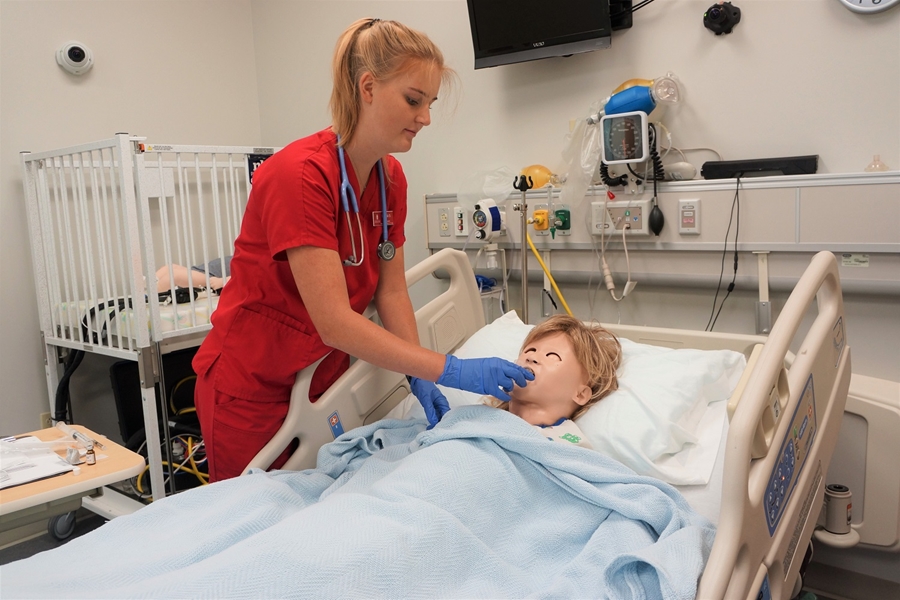The nursing instructors behind a two-way mirror are all powerful. In a simulation lab on the University of Arkansas campus, they can press a computer key and their nursing students have to act quickly to help their "patient," who has been programmed to go into full cardiac arrest. A few more keystrokes in the control room and now the nursing candidates are suddenly providing care for a dying patient.
The insistent beeping of machines in the simulated hospital room, along with a simulated patient who blinks and whose chest rises and falls to mimic breathing, offer an immersive training experience. That's the point: to place nursing students in a variety of medical situations and see how they handle themselves. These future nurses remain calm, assessing the situation and offering appropriate medical treatment.
Students are pre-briefed before each simulation and are advised to maintain the fiction contract that their patients are never called mannequins. In fact, each has a name.
Nursing students aren't graded on their performance in the simulation lab, but are assessed by nursing instructors who offer feedback during post-simulation lab briefings. The two-way mirror helps with that.
"Simulation allowed me to learn and make mistakes without harming a real patient," said Teqienna Randall, who graduated from the U of A’s Eleanor Mann School of Nursing. She works at Northwest Medical Center as a practitioner and just recently came back to the university to serve as a simulation facilitator in the lab.
"This is a place where you can practice real-world scenarios without being criticized," Randall said, recalling her days as a nursing student. "Simulation allows you the opportunity to think critically when the patient needs it most."
This week, Sept. 16-20, is National Society for Simulation in Healthcare Week. The global simulation community is celebrating the professionals who improve the safety, effectiveness and quality of healthcare services every day. This week also raises awareness in communities nationwide about how healthcare simulation is leading to safer, more knowledgeable patient care.
"During the simulations, students can provide care for patients from birth through death," said Tabatha Teal, director of the simulation lab. "The lab provides a safe space for students to practice their skills and receive facilitator and peer to peer feedback. We also believe in inter-professional education — IPE — opportunities with students from other disciplines to prepare future graduates to work and communicate together, thus improving patient safety."
Currently, the simulation lab hosts nutrition from Bumpers College, speech pathology from the College of Education and Health Professions, and UAMS Physical Therapy for IPE opportunities.
The U of A simulation lab recently recreated an assisted living setting which features a simulated patient who needs care. There are also rooms set up to simulate a hospice situation, so students can learn how to help manage end-of-life care, Teal said. There's also a basic hospital setup, a critical care setting and two dedicated medication rooms so students will get a feel for what it's like in an actual hospital. There are also pediatric simulated patients for them to care for.
Senior-level nursing students who are studying obstetrics were recently in the lab with "Lucy" the simulated patient who gives birth. She not only breathes and blinks, but she screams during the pushing phase. And yes, a baby and subsequent placenta does need to be delivered. Students provide care for Lucy during labor and through post-partum, caring for the newborn and the mother. That includes sharing information about how to properly breastfeed.
During simulations, students are to speak to the simulated patient patients as they would real patients. Nursing instructors in the control room answer or ask the nurses questions through a microphone behind the two-way mirror.
Susan Patton, head of the U of A School of Nursing, said the simulation lab is vital to educating nursing students.
"Simulation as a teaching strategy has become integral to nursing education and practice," she said. "Skills that are enhanced with well-designed simulation training include technical expertise, decision making and problem solving, and interpersonal communication. IPE is important for preparing health care professionals to provide patient care in a collaborative environment. Patients receive safer, high-quality care when health professionals work effectively as a team, communicate, and understand each other's roles."
Topics
Contacts
Shannon G. Magsam, director of communications
College of Education and Health Professions
479-575-3138, magsam@uark.edu
